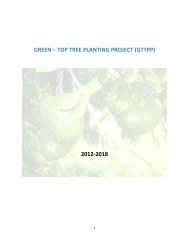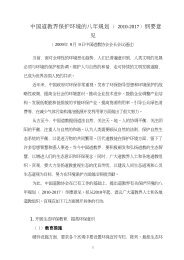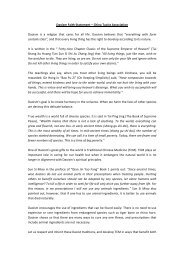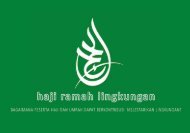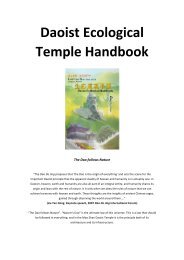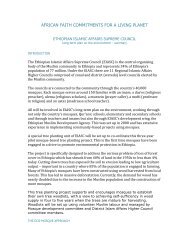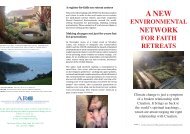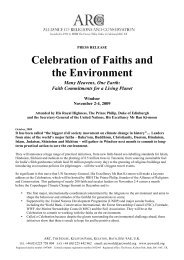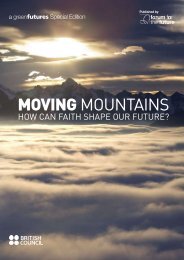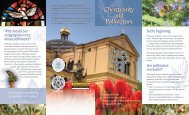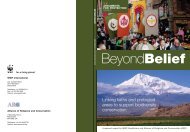summary paper - Alliance of Religions and Conservation
summary paper - Alliance of Religions and Conservation
summary paper - Alliance of Religions and Conservation
Create successful ePaper yourself
Turn your PDF publications into a flip-book with our unique Google optimized e-Paper software.
l<strong>and</strong>clearing <strong>and</strong> to accelerate the new vegetation period, but also <strong>of</strong> traditional reason without<br />
reasonable objectives. The annual burning over long time has caused a dramatic degradation <strong>of</strong> wide<br />
areas: loss <strong>of</strong> fertility, tremendous erosion problems, fall <strong>of</strong> groundwater level, inundation <strong>of</strong> agricultural<br />
l<strong>and</strong> getting choked up with s<strong>and</strong> etc. The pastoral fires are one <strong>of</strong> Madagascar’s biggest ecological<br />
problems <strong>and</strong> a main reason for increasing poverty <strong>of</strong> the rural population. “The forest disappears as you<br />
watch it,” says the American natural scientist Allison Jolly. Massive deforestation has taken place since<br />
the 1970s also accelerated by logging for timber, charcoal production <strong>and</strong> fuel wood collection. The<br />
deforestation has reduced Madagascar’s forests from 20 million to 9 million hectares 12 . Only a fragment<br />
<strong>of</strong> the isl<strong>and</strong>’s original forest cover remains <strong>and</strong> over 300 species <strong>of</strong> its plants <strong>and</strong> animals are threatened<br />
with extinction. With rivers running blood red <strong>and</strong> staining the surrounding Indian Ocean, astronauts have<br />
remarked that it looks like Madagascar is bleeding to death.<br />
Madagascar is a country with agricultural vocation, like the majority <strong>of</strong> the developing countries.<br />
Agriculture constitutes one <strong>of</strong> the dominant activities, <strong>and</strong> the agroalimentary sector represents half <strong>of</strong><br />
the national production. The waste <strong>of</strong> natural resources <strong>and</strong> destroying <strong>of</strong> unique ecosystems by nonsustainable<br />
resource administration is a serious problem for the development <strong>of</strong> the country.<br />
Madagascar belongs to the group <strong>of</strong> “Least developed Countries” with a Human Development Index<br />
(HDI) below 0.500 for several years. 13 The HDI combines measures <strong>of</strong> life expectancy, school enrolment,<br />
literacy <strong>and</strong> income. In spite <strong>of</strong> poverty <strong>and</strong> economical decline during many years the country has a<br />
potential for coming out <strong>of</strong> despair. The isl<strong>and</strong> is rich <strong>of</strong> natural resources, there are good conditions for<br />
agriculture, the population is rather homogeneous <strong>and</strong> there are no serious ethnical or social conflicts.<br />
Gender disparity is lower than in many other developing countries – <strong>and</strong> the actual political situation<br />
seems to be characterized by stability <strong>and</strong> there are serious attempts to achieve good governance since<br />
president Marc Ravalomanana came into power in 2002. During the World Parks Congress in Durban,<br />
South Africa in 2003, President Ravalomanana highlighted the key roles <strong>of</strong> international conventions in<br />
Madagascar’s environmental action plans <strong>and</strong> promised to increase the protected areas in Madagascar in<br />
the years to come.<br />
Return to Green<br />
Fortunately there are big variations. Madagascar has benefited from a 15 year World Bank sponsored<br />
environmental program 14 with the goal to save biodiversity. Natural parks have been arranged for where<br />
authorities try to conserve the flora <strong>and</strong> fauna. Ecotourism has become a source <strong>of</strong> income. Tourism is<br />
now the most important source <strong>of</strong> foreign currency. The conservationist policy <strong>of</strong> the government tries to<br />
turn part <strong>of</strong> the income into development projects for the people who inhabit the forests. Some <strong>of</strong> the<br />
income from ecotourism is used to build public schools, health care centres, <strong>and</strong> facilities for the<br />
population. The idea is that when people benefit from the natural resources they also see the necessity <strong>of</strong><br />
conservation. The national objective for the national efforts is to “reconcile the Malagasy people with its<br />
environment”. 15 It is not possible to develop further the Plan d’Action Environnemental (PAE) here. 16 I<br />
shall turn to the case <strong>of</strong> the Malagasy Lutheran Church <strong>and</strong> its effort to establish “green schools”.<br />
The Malagasy Lutheran Church – Fiangonana Loterana Malagasy (FLM) is a result <strong>of</strong> Norwegian,<br />
American, French <strong>and</strong> lately Danish missionary efforts. The first Norwegian missionaries started the work<br />
in 1867 – 140 years ago. The church now has about 2.5 million members <strong>of</strong> a total population <strong>of</strong> 18<br />
million. The church is autonomous <strong>and</strong> locally administrated, <strong>and</strong> the shrinking number <strong>of</strong> missionaries<br />
now only play the role <strong>of</strong> specialized support. Since the very beginning education has been an integrated<br />
part <strong>of</strong> the outreach <strong>of</strong> the church. In the policy statement <strong>of</strong> the Church it is said: “Evangelical <strong>and</strong><br />
diaconal actions are interdependent <strong>and</strong> there is a strong relationship between testimony through actions<br />
<strong>and</strong> words. Christians have a special responsibility for good deeds because they are all brothers <strong>and</strong><br />
sisters created by the same God who has given them this earth as a common heritage for all peoples <strong>and</strong><br />
12<br />
UNESCO: World Heritage News 2005<br />
13<br />
UNDP: Human Development Index<br />
14<br />
Plan d’Action Environnemental with three phases : PE 1, PE 2 et PE 3. The program started in 1990 with duration<br />
<strong>of</strong> 15 years. In 2004 started the third phase <strong>of</strong> the Environment Action Plan PE 3 with duration <strong>of</strong> new five years.<br />
One <strong>of</strong> the goals is to “reconcile Man <strong>and</strong> his environment so that the present generation <strong>and</strong> those to come can live<br />
in total harmony.”<br />
15<br />
Office National d’Environnement (ONE), Madagascar.<br />
16<br />
Consult Office National d’Environnement (ONE), Madagascar.<br />
43



